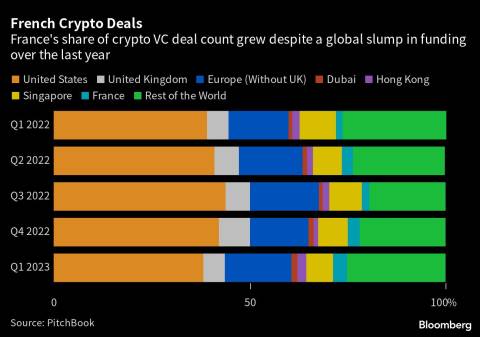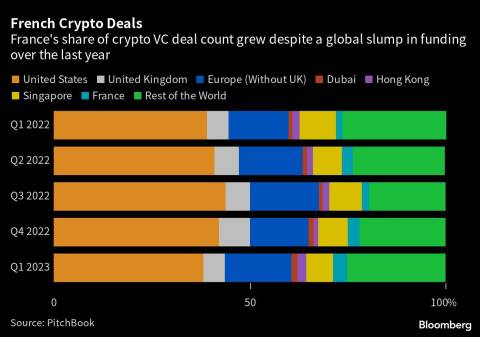(Bloomberg) -- At a crypto conference in Paris in late March, the buzz stood in sharp contrast to the nearby mounds of trash that gave the impression of a breakdown in city services.

As protests and strikes against President Emmanuel Macron’s plan to raise the retirement age roiled the French capital, digital-asset executives rubbed shoulders at a convention space inside the Louvre Palace. Attendees sipped champagne at an evening gathering in the museum section and then were treated to a private viewing of the Mona Lisa and other masterpieces.

The mood was equally at odds with the woes — most of them self-inflicted — that have befallen the industry over the past year.

Proponents like to describe crypto as a truly global phenomenon, linked by blockchains unencumbered by antiquated legacy systems that vary by nation. Yet its world has gotten markedly smaller over the past two years, with China banning most digital assets, Singapore, and Dubai tightening rules and US authorities cracking down following FTX’s messy implosion in November.
Against that backdrop, Macron’s embrace of the sector has prompted companies from Circle Internet Financial Ltd. to Crypto.com and Binance to make Paris their European base. While France is still a small player in crypto and is also working to tighten regulation, its share of venture capital dealmaking jumped in the first quarter in an early sign that Macron’s efforts to attract digital-asset business are starting to bear fruit.
“They want to be a startup nation and I think it’s legit,” Joe Lubin, chief executive officer of New York-based blockchain technology company ConsenSys, said in an interview at the Paris crypto event, which organizers estimated drew around 8,500 attendees, more than the year before. “They do like people in our ecosystem.”
It’s not as if France is idly standing by as other countries clamp down. After FTX’s collapse, senior officials including centrist senator Hervé Maurey and Banque of France Governor Francois Villeroy called for stricter regulations. Earlier this year, parliament pushed through rules requiring more disclosure in areas like pricing policies and conflicts of interest, as well as segregation of customers’ deposits — an intermediary step before European Union-wide regulation takes effect.
Other hurdles abound for a sector that pitches itself as a bastion against government overreach, not least France’s notoriously rigid labor system. And there’s always the risk of a political backlash should crypto get embroiled in more high-profile scandals. Just days after the Paris event wrapped up, the US Commodity Futures Trading Commission sued Binance, the dominant digital-token exchange. The CTFC also sued Binance’s billionaire CEO Changpeng “CZ” Zhao, who tweeted a selfie with Macron last July.
“The government is in a complicated situation,” said Francois-Joseph Schichan, director at consultancy Flint Global and a former French diplomat. “France is going to come under pressure, from the EU and maybe the US, to harden its regulation.”
Still, France’s response has been far more collaborative than the US one. When opening a comment period on proposals to regulate crypto assets in February, the banking regulator said the move should be seen as a “positive signal” for decentralized finance.
Executives gathered in Paris seemed eager to keep it that way. “Very savvy” is how Lubin described officials and regulators. “Very present at all the crypto events,” said Marguerite de Tavernost, a venture capital investor at the Ledger Cathay Fund, about Digital Minister Jean-Noel Barrot. Tom Duff Gordon, vice president of international policy at exchange Coinbase Global Inc., commended policymakers and regulators for taking a “proactive role” in developing a crypto ecosystem.
San Fransisco-based Coinbase is under pressure from authorities at home, announcing March 22 that it’s been notified by the Securities and Exchange Commission that the regulator plans to bring enforcement action against it.
The company is assessing where to base its main EU entity, as the bloc readies its sweeping first set of crypto rules in the Markets in Crypto Assets directive (MiCA), Gordon said. He described France as an “attractive” option, while saying the process ongoing.
Binance has added more than 150 permanent positions in France in less than a year and is still expanding there, David Princay, president of the local unit, said in an email.
‘An Opportunity Not to be Missed’
Macron’s decision to stay the course even as a series of scandals roiled crypto may be partly rooted in broader strategic considerations. Like much of Europe, France watched as US companies like Meta Platforms Inc.’s Facebook and Twitter Inc. dominated what’s often referred to as the second version of the internet, one defined by the advent of social media.
Now, according to crypto advocates, the world is entering the era of web3 — often described as a more decentralized iteration of the internet built around blockchain technology.
Shortly before being reelected in 2022, Macron described web3 as “an opportunity not to be missed,” adding that “France and Europe should be leaders of the future generations of the web.” Even before that, he’d pushed through policies benefiting the sector, like cutting taxes on crypto profits and a new “lighter-touch” registration regime.
“The efforts and policies that have been implemented over the past few years since President Macron was elected are paying off,” Barrot said in an interview in late March. “Efforts to make France a most attractive place for the development of web3 and blockchain-based technologies, including cryptoassets.”
France has other attributes that appeal to crypto executives. A key one is its top-notch engineering schools like École Polytechnique that churn out a steady supply of tech talent. Beyond that, Paris has attracted much of the financial services sector that left London after Brexit, deepening the ecosystem surrounding digital assets. Some of its famed luxury-goods brands, from Louis Vuitton to Cartier, are developing blockchain-based technology to certify their products’ authenticity or track after-sales services.
“It may be just a feeling, but in the last six months it seems like Paris’s crypto ecosystem has accelerated a bit,” said Paul Frambot, CEO of French startup Morpho Labs, the developer of an eponymous blockchain protocol.
Then he added: “Maybe because it is getting a bit more complicated to do blockchain and crypto in other countries.”
--With assistance from Muyao Shen and Emily Nicolle.
More stories like this are available on bloomberg.com
©2023 Bloomberg L.P.
Author: Anna Irrera and Benoit Berthelot
